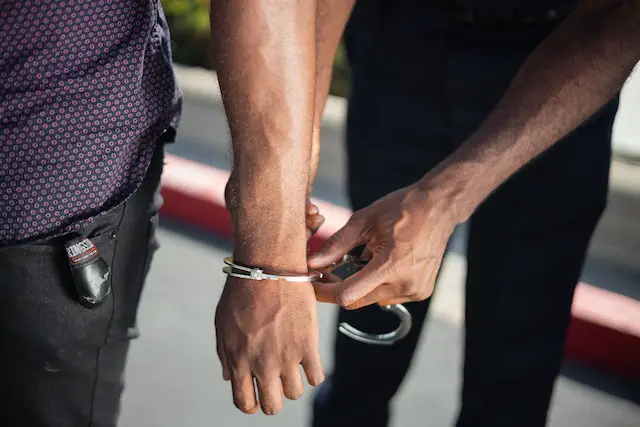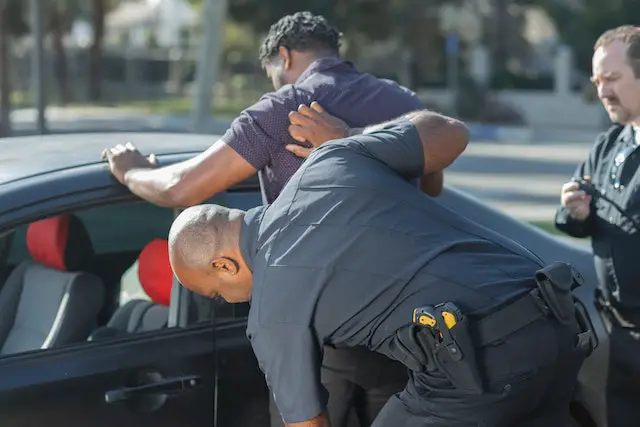
Can You Tell Cops to Get off your property?
The contents of this web page are for informational and educational purposes only, and nothing you read is intended to be legal advice. Please review our disclaimer before taking action based upon anything you read or see.
There is no simple solution to the complicated question: “Can you tell cops to get off your property?”
The specific conditions that apply when the police officials are on your premises, the regulations and legislation in your state, and your particular rights as a proprietor will all play a part in determining the response. But property owners have the right to ask law enforcement officers to leave their property if they are not there with a valid warrant or probable cause to believe that a crime is being committed on the property.
Furthermore, it is commonly essential that police officers who have a warrant have the authority to enter the residential property. This still holds if there is reason to think a crime is occurring on the property. Ordering the police to depart in such circumstances may not be prudent or effective since you risk being liable for impeding justice or tampering with an investigation.
Learn More: Do Police Investigate Civil Matters
On the other hand, you may be able to order the police to depart if they are on the premises without authorization or your knowledge. This is particularly true if the police are abusing or assaulting you or if they are anyway breaching your rights under the law. Come along as we highlight more on this below.
Understanding Your Property Rights

Property rights are a fundamental component of contemporary society and are crucial in ensuring that people may reap the rewards of their labor and investments. Knowing your property rights is essential if you are a tenant, a company owner, or a homeowner. Knowing your property rights fully enables you to defend your rights, make wise judgments, and stay out of legal trouble.
Comprehending what property is is the initial step in comprehending your property rights. Property may be physical (like real estate or buildings) or intangible (like copyrights or trademarks). According to the property, the rights attached, such as the ability to use or sell it, might also change. For example, the rights connected to intellectual property are distinct from those connected to actual property.
Power of Police Officers to Enter your property
Police officers’ right to access your property and authorization to do so have long been contentious issues. Although most people recognize that police officers are responsible for safeguarding the public, others contend that the police shouldn’t have such broad access to private property.
Police personnel have the right and authority to go into your home in a few specific circumstances, first and foremost. These circumstances often entail the possibility of criminal action or the need to protect others from danger or damage.
For instance, a police officer may enter and examine the property if they obtain information that illicit narcotics are being consumed or sold there. Police officers may also enter a residence if there is an allegation of domestic abuse or violent threats to protect the people involved.
Read More: Why Do Police Not Become Involved In Civil Cases
The justifications for giving police officers broad access to a person’s home are clear. The protection of the general population is the police’s main duty.
Additionally, they must be capable of taking swift and decisive action to halt illegal activities or avert injury. In certain situations, police officers must have extensive power to gain access to personal property to safeguard the public because they must act swiftly and without hesitation.
When can you tell cops to get off your property?
There are circumstances in which you may order police to leave your home, but it’s crucial to understand the legal implications. The Constitution’s Fourth Amendment ensures the right to privacy and protection against arbitrary searches and confiscation. Thus, here are some valid instances where you can tell cops to get off your property:
1. If the authorities lack a warrant or reasonable suspicion
If police visit your property without a warrant or reasonable suspicion, that is one of the most frequent instances in which you may ask them to leave. A court-issued warrant is a formal document that gives the police permission to carry out a certain task, like examining your home. The police do not possess the authority to enter your property without your consent if they do not possess a warrant or reasonable suspicion.
2. If law enforcement wrongfully violates your constitutional rights
You can request that the police depart your property if they breach your constitutional rights or use unnecessary force. Physical injuries, such as striking or choking, and improper weapon use may all be considered excessive force. To safeguard your civil liberties, if the police violate them, you should speak with a lawyer immediately.
3. If law enforcement enters without your permission
You may order the cops to leave if they invade your property without your permission. When a warrant is being served, or an emergency arises, the police may need to access your property. You may, however, only allow the police in if they access the premises with approval and you did not provide them authorization.
Legal Consequences of Refusing to Comply with Police Officers

Some Legal consequences of refusing to comply with police officers include:
1. Arrests and Charges
If you ignore a police officer’s commands, you risk being arrested and prosecuted. Even though everyone is entitled to civil liberties and constitutional rights, disobeying a police order may constitute obstruction of justice, a serious crime.
An arrest might result in criminal documentation, limiting your options for future housing and work. In addition to fines and community work, prosecution might result in jail.
2. Tighter Police Inspection
The situation may get out of hand when someone defies a police officer. Police officers may inspect the person more deeply if they refuse because they could assume guilt or suspicion.
Police officers could also see defiance as a threat, which could quickly turn a routine stop into a potentially hazardous altercation. Conflicts among the general population and the police force may result from increased police inspection since it might breed distrust and prejudice.
3. Loss of the Right to Drive
Losing the ability to drive might result from refusing to cooperate with a police officer following a traffic stop. In most states, a driver’s license may be suspended for a certain time if they refuse to submit to a breathalyzer test.
It may be challenging for someone to move about freely if their driver’s permit gets withdrawal or suspension after failing to cooperate with a cop during a traffic check.
What to do if you feel your property rights have been violated
Your legal rights are essential as the property owner. But it’s conceivable for other people to violate your property rights. If you believe your property privileges have been infringed, you should take action immediately to make things right. Here are some steps you can take to protect and defend your property rights:
1. Compile evidence
Ensure you have evidence when you suspect your property rights have been infringed. Photographs, films, and eyewitnesses are examples of this. Your case will be stronger in court if you have more supporting documentation. Consider hiring a private detective if you cannot gather proof alone.
2. Speak to the authorities
You may need to contact the authorities for assistance, contingent upon the specifics of the infraction. For instance, you ought to alert the police if an individual is trespassing on your property or inhabiting your building. Contact a local mediator or property law attorney if the infraction affects a neighbor or community organization.
3. File a lawsuit
It could be essential to file a lawsuit if your efforts to resolve the matter via mediation are unsuccessful. You may initiate a lawsuit against the offender to get a cease-and-desist order.
4. Consult a lawyer
You will want the counsel of a skilled and knowledgeable property lawyer to pursue successful legal action. A competent attorney will guide you through the legal process, obtain proof, and advocate for your interests in court.
Role of search warrants in police property searches
Police property searches must always have a search warrant. It is an order from the court instructing the police to look for certain objects connected to a probable crime in a particular place.
The warrant specifies the parameters of the search, including its duration and goals, and it also gives the police the legal justification they need to carry it out.
Protecting individual rights is one of a search warrant’s main purposes. People have the right to be safe in their homes and possessions against arbitrary searches and seizures.
This is according to the Fourth Amendment of the U.S. Constitution. A warrant for a search protects citizens from police wrongdoing. It also ensures that law enforcement officers stay within bounds by violating people’s privacy with valid reasons.
My Opinion
In all, there are situations in which you may order police to leave your property. And this was already said previously. It is also important to remember that state and local laws governing police behavior on private property might differ significantly.
When it comes to when police may access personal property with a warrant, some states have rigorous regulations. Others also have softer guidelines.
Furthermore, certain conditions may significantly impact your ability to request that police leave your property. So, if you have cops on your property, it is always beneficial to speak with an attorney.
References
- ACLU of Northern California; Your Rights and the Police: https://www.aclunc.org/our-work/know-your-rights/know-your-rights-police-interactions
- Snopes on Entrapment: https://www.snopes.com/fact-check/are-you-a-cop/
- The Role and Responsibilities of the Police: http://www.psi.org.uk/publications/archivepdfs/Role%20pol/INDPOL-0.P.pdf
- United States Constitution, Fourth Amendment: https://www.law.cornell.edu/wex/fourth_amendment
- “Your Rights When Dealing With Law Enforcement,” American Civil Liberties Union: https://www.aclu.org/know-your-rights/your-rights-when-dealing-law-enforcement
- Police Officers and the Law,” Legal Information Institute: https://www.law.cornell.edu/wex/police_officers_and_the_law

I’m a driven and accomplished law graduate and post-graduate, passionate about sharing my legal expertise via my blog. I hold a Bachelor’s degree in Law from the University of London (UK) and a Master’s in Law from the University of Derby (UK). Both gave me the foundational knowledge and skills to excel in my chosen career path.
Throughout my academic journey, I have gained extensive knowledge in various fields of Law, including Corporate and Business Law in the USA, Criminal Law, International Law, US Copyright law, and most importantly, American Constitutional law.


Comments are closed.